Samuel Adams
Samuel Adams
The Life of an American Revolutionary
John K. Alexander
ROWMAN & LITTLEFIELD PUBLISHERS, INC.
Lanham Boulder New York Toronto Plymouth, UK
Published by Rowman & Littlefield Publishers, Inc.
A wholly owned subsidiary of The Rowman & Littlefield Publishing Group, Inc.
4501 Forbes Boulevard, Suite 200, Lanham, Maryland 20706
http://www.rowmanlittlefield.com
Estover Road, Plymouth PL6 7PY, United Kingdom
Distributed by the National Book Network
Copyright 2011 by Rowman & Littlefield Publishers, Inc.
First paperback edition 2013
All rights reserved. No part of this book may be reproduced in any form or by any electronic or mechanical means, including information storage and retrieval systems, without written permission from the publisher, except by a reviewer who may quote passages in a review.
British Library Cataloguing in Publication Information Available
Library of Congress Cataloging-in-Publication Data
The hardback edition of this book was previously cataloged by the Library of Congress as follows:
Alexander, John K.
Samuel Adams : the life of an American revolutionary / John K. Alexander.
p. cm.
Includes bibliographical references and index.
1. Adams, Samuel, 17221803. 2. PoliticiansUnited StatesBiography. 3. United States. Declaration of IndependenceSignersBiography. 4. United StatesHistoryRevolution, 17751783Biography. 5. United StatesPolitics and government17751783. I. Title.
E302.6.A2A543 2011
973.3092dc22
[B] 2010045582
ISBN: 978-0-7425-7033-7 (cloth : alk. paper)
ISBN: 978-0-7425-7034-4 (pbk. : alk. paper)
ISBN: 978-0-7425-7035-1 (electronic)
 The paper used in this publication meets the minimum requirements ofAmerican National Standard for Information SciencesPermanence of Paperfor Printed Library Materials, ANSI/NISO Z39.48-1992.
The paper used in this publication meets the minimum requirements ofAmerican National Standard for Information SciencesPermanence of Paperfor Printed Library Materials, ANSI/NISO Z39.48-1992.
Printed in the United States of America
For my favorite historian,
June Granatir Alexander
Contents
Preface
Samuel Adams was a titan of Americas greatest generationthe generation that achieved independence and crafted written constitutions that made the ideal of republican government a living reality in the new nation. Samuels contemporaries, both friend and foe, understood his importance. In the fall of 1770, Stephen Sayre, an American born in New York but living in England, famously called Samuel Adams the Father of America. In July 1773, George Clymer, a future signer of the Declaration of Independence, met Adams in Boston. Upon returning home to Philadelphia, Clymer, having been awed by Adamss integrity and abilities, gushed that all good Americans should erect a statue to him in their hearts. Time and again as the colonists moved ever closer to the break with Great Britain, advocates of defending American rights singled out Samuel Adams for the influence he exerted. In 1780, James Warren, a fellow Massachusetts revolutionary, even extolled Samuel as the Man who had the greatest hand in the greatest Revolution in the world.
George IIIs supporters ruefully agreed that Samuel Adams played a pivotal role in the coming of the American War for Independence, only they usually voiced it with hatred, malice, and loathing. When the prominent Massachusetts loyalist Peter Oliver penned a lengthy description of Adams as a vile rebel, the opening lines set the tone. Oliver expressed agreement with a painter who said that, if he wanted to draw a picture of the devil, he would have Samuel Adams sit for the portrait. In the late spring of 1774, an anonymous advocate of England produced a list of evil men supposedly leading the people of Massachusetts to their ruin; Adamss name headed the list. In January 1775, the London Gazetteer published a letter from Boston whose author called Adams the planner of all the measures of the rebels. In July, the London Morning Post offered its readers an extract of a letter from Rhode Island. Belittling Adams as having nothing to lose and hoping to gain every thing, the author styled him a man properly calculated to become a consequential leader in times of anarchy.
Given his fame, or infamy, it is hardly surprising that, upon meeting Samuel Adams in December 1780, a French general casually observed that everybody in Europe knows that he was one of the prime movers of the present revolution. As important as Adams was in the coming of the revolution, it would be a mistake to focus narrowly on the years through 1776. As Samuel himself emphasized, the American Revolution involved much more than proclaiming independence and forcing Great Britain to acknowledge it. As he steadfastly asserted and worked diligently to ensure, the British had to yield the territory and rights to natural resources necessary for the new nation to prosper. For its part, the revolutionary generation had to craft governments and strive to mold societies that would make independence worth having. Samuel Adams had an important hand in those endeavors. He helped shape the influential Massachusetts constitution of 1780, and, although he was not one of the framers or even an ardent proponent of the United States Constitution of 1787, he played a central role in its adoption. Then, in the 1790s, especially as the governor of Massachusetts, he took an active part in the contentious struggle over interpreting and implementing the new national constitution. In addition, from the start of the American War for Independence onward, Adams also devoted considerable thought and effort to creating what he termed a virtuous society.
Samuels cousin and fellow revolutionary John Adams knew of his cousins expansive and pivotal role in the revolutionary era when he proclaimed that without the true character of Samuel Adams, the true history of the American Revolution can never be written. James Sullivan, Samuels old friend and oftentimes political ally, expressed a similar thought when he wrote a lengthy obituary upon Adamss death. Saying he had produced but a gazette sketch of Samuel Adams, Sullivan asserted that to give his history at length, would be to give an history of the American revolution.
Despite their boldness, there is much truth in the judgments John Adams and James Sullivan offered. Certainly the story of Samuel Adams, American revolutionary, compels us to think about why and how the revolution occurred; it also forces us to confront the ideas and assess the actions of those Americans who opposed the revolutionary movement. In addition, Adamss life story reveals a great deal about how the American Revolution played out and how it influenced politics and society in late eighteenth-century America and beyond.
Notwithstanding his central role during the era of the American Revolution, scholarly interest in Samuel Adams has fluctuated dramatically, and so too have the assessments of him. In the nineteenth century, Adams was typically praised as one of the greatest heroes of the revolution; by the mid-twentieth century, he was often denigrated as a mob-leading demagogue. An occasional biography of Samuel Adams appeared in the decades that followed. But it has only been in the last few years, amid renewed interest in the era of the American Revolutionand especially interest in those typically called the founding fathersthat Samuel Adams has once again drawn significant attention.
However they interpret him, those who study Samuel Adams must contend with the fact that eighteenth-century American English looks strange to the modern reader. In addition to British English and obsolete spellings (such as colour , defence , and centinel ), one encounters added letters (such as republick ), peculiar omissions (such as observd ), or seemingly missing letters (such as pressd for pressed ). And while writers of that era often sprinkled their prose with capital letters, the word negro was rarely capitalized. Still, what looks odd to the modern eye was not necessarily wrong in the eighteenth century. Accordingly, I have followed this rule: quotations are given without alteration and without any attempt to indicate errors through the use of [sic] . In the very few cases where it seemed necessary to add material for claritys sake, it has been inserted in brackets. These points merit special comment because in crafting this biography I have striven to allow Adams and the people who lived in his time ample opportunity to express themselves in their own words.

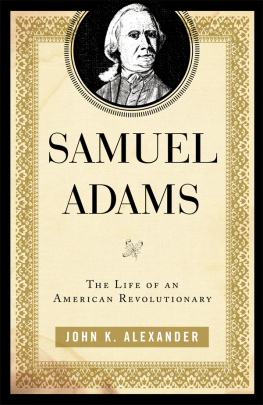

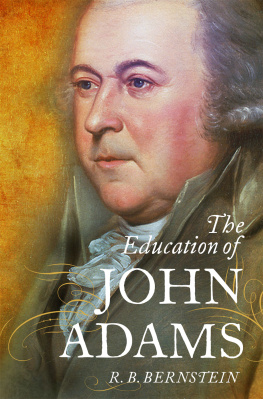
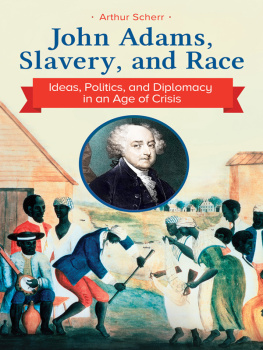
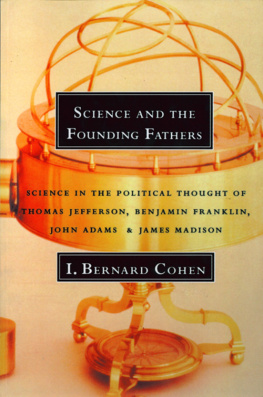
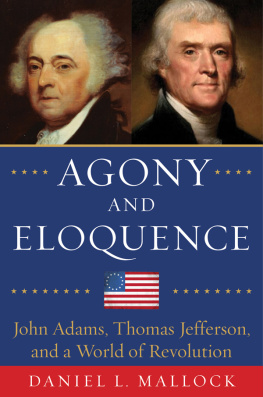
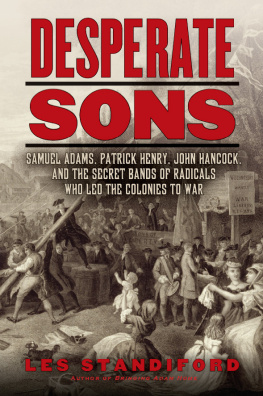

 The paper used in this publication meets the minimum requirements ofAmerican National Standard for Information SciencesPermanence of Paperfor Printed Library Materials, ANSI/NISO Z39.48-1992.
The paper used in this publication meets the minimum requirements ofAmerican National Standard for Information SciencesPermanence of Paperfor Printed Library Materials, ANSI/NISO Z39.48-1992.